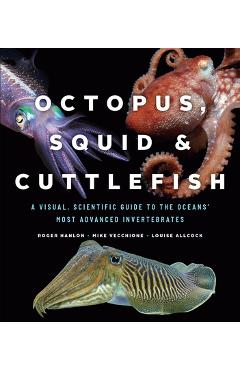Octopus, Squid, and Cuttlefish: A Visual, Scientific Guide to the Oceans\' Most Advanced Invertebrates - Roger Hanlon

Detalii Octopus, Squid, and Cuttlefish: A
libris.ro
239.94 Lei
266.6 Lei
Science
Roger Hanlon
Octopus, Squid, and Cuttlefish: A - Disponibil la libris.ro
Pe YEO găsești Octopus, Squid, and Cuttlefish: A de la Roger Hanlon, în categoria Science.
Indiferent de nevoile tale, Octopus, Squid, and Cuttlefish: A Visual, Scientific Guide to the Oceans\' Most Advanced Invertebrates - Roger Hanlon din categoria Science îți poate aduce un echilibru perfect între calitate și preț, cu avantaje practice și moderne.
Preț: 239.94 Lei
Caracteristicile produsului Octopus, Squid, and Cuttlefish: A
Comandă Octopus, Squid, and Cuttlefish: A Online, Simplu și Rapid
Prin intermediul platformei YEO, poți comanda Octopus, Squid, and Cuttlefish: A de la libris.ro rapid și în siguranță. Bucură-te de o experiență de cumpărături online optimizată și descoperă cele mai bune oferte actualizate constant.
Descriere magazin:
Cephalopods are often misunderstood creatures. Three biologists set the record straight.-- Science News Largely shell-less relatives of clams and snails, the marine mollusks in the class Cephalopoda--Greek for head-foot--are colorful creatures of many-armed dexterity, often inky self-defense, and highly evolved cognition. They are capable of learning, of retaining information--and of rapid decision-making to avoid predators and find prey. They have eyes and senses rivaling those of vertebrates like birds and fishes, they morph texture and body shape, and they change color faster than a chameleon. In short, they captivate us. From the long-armed mimic octopus--able to imitate the appearance of swimming flounders and soles--to the aptly named flamboyant cuttlefish, whose undulating waves of color rival the graphic displays of any LCD screen, there are more than seven hundred species of cephalopod. Featuring a selection of species profiles, Octopus, Squid, and Cuttlefish reveals the evolution, anatomy, life history, behaviors, and relationships of these spellbinding animals. Their existence proves that intelligence can develop in very different ways: not only are cephalopods unusually large-brained invertebrates, they also carry two-thirds of their neurons in their arms. A treasure trove of scientific fact and visual explanation, this worldwide illustrated guide to cephalopods offers a comprehensive review of these fascinating and mysterious underwater invertebrates--from the lone hunting of the octopus, to the social squid, and the prismatic skin signaling of the cuttlefish.

Produse asemănătoare

Boilies Dynamite Baits Fresh Squid Octopus And Black Pepper 15mm
![]() claumarpescar.ro
claumarpescar.ro
Actualizat in 27/01/2026
33.3 Lei

Pop-up Dynamite Baits Fluoro Squid And Octopus Plus Lichid Atractant 20mm
![]() claumarpescar.ro
claumarpescar.ro
Actualizat in 27/01/2026
27.75 Lei

Pelete Pentru Carlig Dynamite Baits Squid And Octopus 22mm
![]() claumarpescar.ro
claumarpescar.ro
Actualizat in 27/01/2026
57.93 Lei

Pelete Pentru Carlig Dynamite Baits Squid And Octopus 40mm
![]() claumarpescar.ro
claumarpescar.ro
Actualizat in 27/01/2026
48.84 Lei

Pelete Pentru Carlig Dynamite Baits Squid And Octopus 30mm
![]() claumarpescar.ro
claumarpescar.ro
Actualizat in 27/01/2026
48.84 Lei

Lichid Attract Dynamite Baits Fresh Squid Octopus And Black Pepper
![]() claumarpescar.ro
claumarpescar.ro
Actualizat in 27/01/2026
27.75 Lei
Produse marca Roger Hanlon

Octopus, Squid, and Cuttlefish: A Visual, Scientific Guide to the Oceans\' Most Advanced Invertebrates - Roger Hanlon
![]() libris.ro
libris.ro
Actualizat in 28/10/2025
239.94 Lei